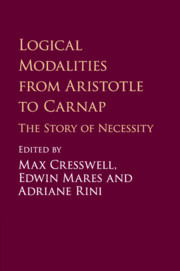Book contents
- Frontmatter
- Contents
- List of Figures and Tables
- List of Contributors
- List of Abbreviations
- Introduction
- 1 Aristotle on the Necessity of the Consequence
- 2 Aristotle on One- Sided Possibility
- 3 Why Does Aristotle Need a Modal Syllogistic?
- 4 Necessity, Possibility, and Determinism in Stoic Thought
- 5 Necessity in Avicenna and the Arabic Tradition
- 6 Modality without the Prior Analytics: Early Twelfth Century Accounts of Modal Propositions
- 7 Ockham and the Foundations of Modality in the Fourteenth Century
- 8 Theological and Scientific Applications of the Notion of Necessity in the Mediaeval and Early Modern Periods
- 9 Locke and the Problem of Necessity in Early Modern Philosophy
- 10 Leibniz's Theories of Necessity
- 11 Leibniz and the Lucky Proof
- 12 Divine Necessity and Kant's Modal Categories
- 13 Charles Sanders Peirce on Necessity
- 14 The Development of C. I. Lewis's Philosophy of Modal Logic
- 15 Carnap's Modal Predicate Logic
- Bibliography
- Index
12 - Divine Necessity and Kant's Modal Categories
Published online by Cambridge University Press: 05 September 2016
- Frontmatter
- Contents
- List of Figures and Tables
- List of Contributors
- List of Abbreviations
- Introduction
- 1 Aristotle on the Necessity of the Consequence
- 2 Aristotle on One- Sided Possibility
- 3 Why Does Aristotle Need a Modal Syllogistic?
- 4 Necessity, Possibility, and Determinism in Stoic Thought
- 5 Necessity in Avicenna and the Arabic Tradition
- 6 Modality without the Prior Analytics: Early Twelfth Century Accounts of Modal Propositions
- 7 Ockham and the Foundations of Modality in the Fourteenth Century
- 8 Theological and Scientific Applications of the Notion of Necessity in the Mediaeval and Early Modern Periods
- 9 Locke and the Problem of Necessity in Early Modern Philosophy
- 10 Leibniz's Theories of Necessity
- 11 Leibniz and the Lucky Proof
- 12 Divine Necessity and Kant's Modal Categories
- 13 Charles Sanders Peirce on Necessity
- 14 The Development of C. I. Lewis's Philosophy of Modal Logic
- 15 Carnap's Modal Predicate Logic
- Bibliography
- Index
Summary
Introduction
The Pölitz transcripts of Kant's lectures from the 1780s on rational theology contain a fascinating discussion of modality:
On this point rests the only possible ground of proof for my demonstration of God's existence, which was discussed in detail in an essay I published some years ago. Here it was shown that of all possible proofs, the one that affords us the most satisfaction is the argument that if we remove an original being, we at the same time remove the substratum of the possibility of all things. – But even this proof is not apodictically certain; for it cannot establish the objective necessity of an original being, but establishes only the subjective necessity of assuming [annehmen] such a being. But this proof can in no way be refuted, because it has its ground in the nature of human reason. For my reason makes it absolutely necessary for me to assume a being which is the ground of everything possible, because otherwise I would be unable to know what in general the possibility of something consists in [worin etwas möglich sey]. (Pölitz RT, Ak. 28:1034)
The “essay published some years ago” to which Kant here refers is his 1763 work The Only Possible Ground of Proof in Support of a Demonstration of the Existence of God (henceforth, OPG). While the exact interpretation of that work is controversial, it is clear that he there defends an interconnected set of claims about possibilities and their grounds:
(1) It is logically possible that p iff p does not entail a contradiction. This is the definition of logical possibility. (Ak. 2:77)
(2) Not all logical possibilities are real possibilities (Ak. 2:77, 85). Kant does not explicitly offer a developed theory of what real possibility is, but it is clear that real possibility is more “metaphysically robust” than mere logical possibility. He also lays down certain conditions on it. For instance,
(3) If it is really possible that p then some existing being grounds the fact that it is really possible that p (Ak. 2:78, 79). As with (2), Kant does not explicitly offer a developed theory of the relation between real possibilities and their grounds.
- Type
- Chapter
- Information
- Logical Modalities from Aristotle to CarnapThe Story of Necessity, pp. 232 - 255Publisher: Cambridge University PressPrint publication year: 2016



